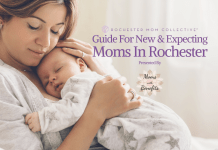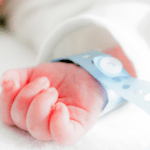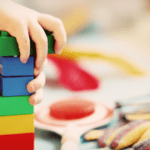
You know that feeling you get when you meet someone who has something niche in common with you? Like loving the same rare book, or growing up in the same small town? That’s the feeling moms of kids with special needs get when they meet other moms sharing their experiences. There’s usually a particular kind of understanding that we might not get from other moms. We vent, we cheer each other on, we commiserate, we share “industry secrets”. We just “get it”.
Two Rochester Mom Collective writers parenting children with Autism Spectrum Disorder (ASD) became fast friends and chose to collaborate for Autism Acceptance Month. Listen in as we discuss the questions people always ask us about our families’ Autism journeys.
What did you know about ASD before you were the parent of a child with ASD?
Mom 1: I had always been terrified of Autism. All I knew were the negative stereotypes I had seen in the media. I thought people who had Autism didn’t feel or show love. Any individuals I had met in the past who had had ASD appeared to be severely impacted and it was intimidating to me. However, I realize now that they were most impacted by their comorbidities (the simultaneous presence of two or more diseases or medical conditions).
Mom 2: As a former Special Education teacher with an Autistic husband (late diagnosed), I had a fair understanding of Autism. However, it is said, “if you’ve met one person with autism, you’ve met one person with autism.” A diagnosis of Autism presents differently in each person. I quickly realized that I was familiar with educating students on the spectrum, but my understanding of the whole Autistic person was limited.
Why did you have your child evaluated for ASD?
Mom 1: In one of the first videos we got of our son from the adoption agency, he is sitting down with one of those classic wooden peg and ring baby toys. His foster mother is sitting next to him, showing him how to put the rings on the pegs. Every time she drops a ring on the peg, he giggles. Then he takes the rings off the pegs, drops them on the floor, and giggles some more. I remember thinking to myself, “He’s not interested in playing with the toy. He’s laughing at the clanging sound of the pegs.” A distant alarm rang out, deep in my mom psyche.
We met our son in person a year later and he exhibited many of the classic markers of ASD. He was three years old but didn’t use many meaningful words. He held toys with flashing lights right up to his eyes. He wasn’t playing with any of the toys the way they were meant to be played with. Instead, he would hold them close to face and tap them with his index finger. When we went back to our Airbnb that afternoon, I told my husband that I knew that our soon-to-be son had Autism.
Mom 2: Knowing ASD is strongly genetic, it was on my radar before having children. When our first daughter was born, her mannerisms stood out, even at the hospital. We tracked her closely, but were confused because she did not display typical signs of Autism.
Later, we discovered the defined characteristics and evaluations for Autism were created by studying males. When we took our daughter for an evaluation at four years old, the psychologist considered our anecdotes as strong evidence. I didn’t think my daughter was Autistic because her characteristics did not align with the lists online. Sometimes it is difficult to know or recognize the signs when you are close to somebody, so a good professional can help you.
What strengths does your child have that are specifically tied to their ASD?
Mom 1: Our son is a great kid with a neat personality. Some of the most interesting aspects of his character are directly linked to his Autism. For example, he loves music – listening to the radio with him is an adventure. He only needs to listen for a couple seconds before he can start singing along. He instantaneously knows what song is on and what part of the song is playing. After hearing a song only once, he can have most of the lyrics and all of the beat memorized.
Time and space are also really important to our son. He always knows the date, time, and the driving directions to get from one location to another. He also knows every family member’s birthday, including extended family. I especially love that he’s the only one besides me who appreciates our family calendar. He is always sure to remind us of upcoming appointments and holidays.
Mom 2: Our daughter is a beautiful powerhouse. She is outgoing, confident, brave, and intelligent. She will try anything she sets her mind to, and rarely lets what others think hold her back. We view her as a strong leader, both now and in her future. These traits are related to her ASD because she processes and assesses situations through her own lens and not through the eyes of others. We work together diligently with our family and community supports to help her use these gifts safely.
What are your hopes for your child’s future?
Mom 1: I hope my son will be able to live independently from us, maybe in an assisted living facility with some roommates. He is very social and loving. I want him to have a stable network of support, similar to a family structure, especially when my husband and I are gone. I hope he remains close with his siblings and that they will continue to include him in their lives as they grow and possibly start their own families. I think our son will be a fantastic uncle in the future! He would do great working a full-time job with a consistent schedule where he could interact with people on a regular basis. I hope he has a life where he is safe, healthy, and fulfilled but also feels challenged and excited to keep learning new things.
Mom 2: My daughter loves math and science, and wants to be an “astronaut-scientist-engineer”. We plan to fully support her as she works towards her goals. That said, supporting her may look different than supporting a non-autistic child. We want her to choose her path and will always give her the support she needs as an adult, whether allowing her to live at home for an extended time, helping with executive functioning skills, or just offering advice and encouragement in a world that may not understand her. Our way of supporting her future now is through advocating for therapies and normalizing accessing support. We let her see that we all get support from services, friends, and family. We never want her to think that she has to do life on her own, or feel insecure about using additional resources or accommodations.
What’s difficult about explaining ASD to people who don’t know much about it?
Mom 1: I don’t like to explain it. It’s too difficult because so much of Autism is still unknown. The spectrum is too wide and long. There are risk factors but there’s no one definitive cause and too many people get stuck on the “why”. I can describe the criteria for being diagnosed with ASD but those signs can vary from person to person. Consider how differently a special interest might be demonstrated when a person is verbal versus non-verbal or how self-stimulatory behaviors are affected by individual motility. Pop culture only shows individuals who either present as quirky geniuses or who are deeply impacted and appear non-communicative, aggressive, and/or disengaged. But having Autism can mean having none, all, or any combination of those markers.
Mom 2: ASD is a tricky subject to talk about. There are stigmas surrounding it, whether it’s due to a belief in over-diagnosis, the fear of labels, or uninformed judgements. Trying to share the scope of ASD can be difficult and feel convoluted. Oftentimes, I like to be the first one to share, so I can set the tone of the conversation. I find one-on-one conversations the most productive so I can help create a safe space for someone to learn through an on-going dialogue. Through our conversations many people gain a new perspective on a friend or loved one that they hadn’t considered before. Conversely, it can be most difficult interacting with those closest to me and some professionals who, instead of being my strongest supports, tend to reject my daughter’s diagnosis or give unhelpful push-back.
What advice would you give to parents who just received an ASD diagnosis for their child?
Mom 1: Congratulations! Of all the possible diagnoses your child could have received, you got one of the most well-known! There are tons of resources, organizations, proven strategies, support groups, and been-there-done-that families who have already led the way. Speaking from experience, this is the kind of diagnosis that you want. If I could go back in time to when we first received my son’s diagnosis, I would tell myself to spend less time worrying about the future and more time just loving my child. There will be plenty of time spent knee-deep in therapies and appointments and meetings, etc. Don’t let those be the only memories of your kid’s childhood. Don’t forget to just enjoy your child.
Mom 2: Two things that I needed to embrace were: 1) Remember that your child is still your child. The Autism is real, but it does not take away the child you have known and loved all of these years. 2) Find community. The Autism community in Rochester is amazing. You’ll find others who have similar experiences and are waiting to connect with you. We all do better when we find others who love us and our children right where we are.
[showtpost id=”11040″]















